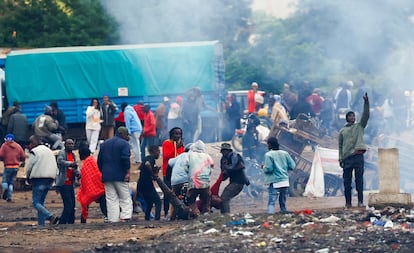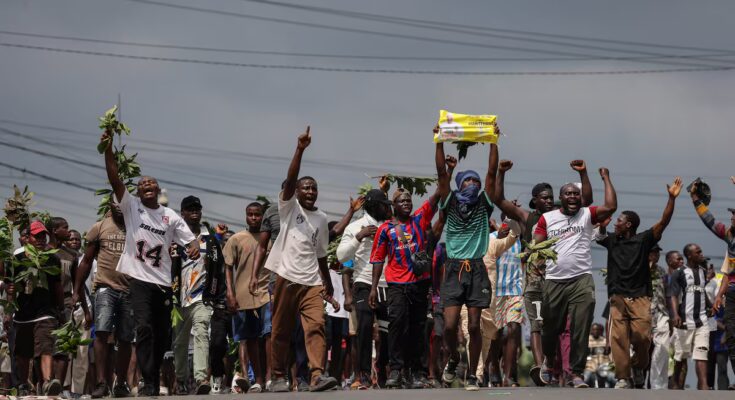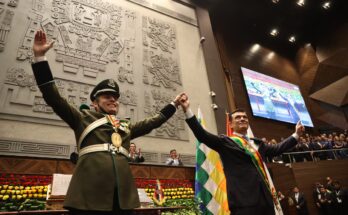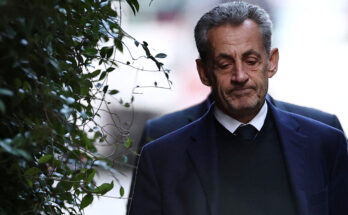From Kenya to Madagascar, from Senegal to Cameroon, from Tanzania to Nigeria or from Morocco to Mozambique. A wave of protests led by young people under 30, the so-called Generation Z, is sweeping Africa and seems unstoppable. They occupy streets and public spaces, confront law enforcement, destroy elections or overthrow regimes. In some countries they are faced with leaders who remain in power forever and cheat at the polls, in others they struggle against high prices of living, lack of work or cuts to water and electricity. They are organized on social networks as horizontal movements. They want facts, not promises, they are looking for new references and allies and are breaking the cords of the old pacts that served their parents and grandparents, but which suffocate this African generation Z, as tired of the old as it is free from any commitment.
As if it were a symbol of what we are fighting against, in just one week of October, the African continent saw the re-election of three presidents: the Cameroonian Paul Biya, 92 years old, in office since 1982; the Ivorian Alassane Ouattara, 83 years old, who is starting his fourth presidential term, and the Tanzanian Samia Suluhu Hassan, 65 years old, at the head of a political party in power since 1977.
In all three countries, the path to re-election was clear after key opposition leaders were eliminated from the presidential race after being imprisoned, convicted or judicially removed. The procedure is not new, but it is no longer easily digestible: protests have shaken electoral processes, with particular intensity in Tanzania, where hundreds of deaths have been recorded due to police violence.
Weeks earlier, Madagascar’s president, Andry Rajoelina, had fled the country after a month of protests by young people waving the pirate flag in the cartoon’s straw hat. One piece. At the same time, young people from Generation Z were shaking up Morocco’s usual stability by demanding more money for hospitals and schools and less for building football stadiums.
In Kenya, an attempt to raise taxes last year led to demonstrations that burned down Parliament and were suppressed with great violence, while in Senegal thousands of young people erupted in anger in 2021 against a government that used the law to attack opposition leader Ousmane Sonko, promoting a landslide election from the streets. Mozambique, Nigeria, Uganda and Togo have also experienced recent protests with the common denominator of their main protagonists, young people.
Reparation and justice
“These are revolts in which there is no political utopia,” says Abdourahmane Seck, a Senegalese anthropologist and historian, “young people are not asking for democracy, but for reparation and justice.” In his opinion, to find the answers it is necessary to delve into the colonial past, when former European metropolises and African elites agreed to maintain close ties after independence and supported dictatorships and authoritarian regimes.
“Then, the supposed democratization of the 90s brought neither dignity nor well-being, many people feel cheated”, continues Seck. “Now, our societies have produced a generation that has not been fed from the same bottle: they communicate through social networks, they expose themselves publicly, they speak other languages. And they have their intellectual producers. It is not something punctual, but structural. It will continue and they will blow down all the dams and barriers.”
And understanding the impact of this generation first of all means understanding its demographic weight: 60% of the African population is under 25 years old. They did not live the dream of anti-colonial liberation or the hope of democracy. They grew up with a cell phone in their hand through which they interact with the world. They see, on their screens, other possible worlds. They demand healthcare that takes care of them, a minimum quality education and a job with a decent salary.
In Mali, a viral video of his son partying on a yacht sparked the riots that overthrew President Keita in 2020; in Morocco, the death of a dozen women in hospital due to bad anesthesia; in Madagascar, cuts to electricity and water.
These are concrete facts, but the discomfort is profound. “Despite the different contexts from one country to another, the context is the same: a profound rejection of dominant political practices and a disillusionment with their leaders, perceived by some as too close to Western interests. For many young Africans, the political and social struggle continues to be a collective ghost fueled both by the legacy of great independence figures (…) and by disillusionment with contemporary reality and unfulfilled promises”, says Bah Traoré, head of the research. from the Wathi study center.
Old African regimes, with leaders in power for 20, 30 or 40 years, show signs of exhaustion but refuse to die and do so with great violence. In Tanzania the dead and missing are still being counted and in Kenya mass graves have appeared. “We are not afraid,” reflects on the phone the young Awa Agbessi, 24 years old, from Togo, where this generation leads the protests against the Eyadema clan, which took control of the state’s resources in 1967 until today. “They gas us, they beat us, they prevent us from demonstrating. But we are determined to change things and move our country forward. Politicians only think about their pockets, we believe in the future”, he says solemnly. Women, increasingly educated, play a decisive role in these movements. “Generation Z has only raised its head again,” he emphasizes.

Disappointed by their leaders, whom they accuse of widespread corruption, nepotism and submission to the West, they take to the internet or the streets and fearlessly proclaim themselves pan-Africanists, anti-colonialists, sovereignists or anti-capitalists. In the Sahel or in Guinea-Conakry, military committees came to power that were able to read the signs of the times, supported by these young people.
Captain Ibrahim Traoré, the young leader of Burkina Faso (34 years old), has suspended all political activity and jails anyone who dares to raise their voice against his military regime, but he has become the great reference point for thousands of young people thanks to a ferocious propaganda campaign where the new protesters are fed, on social networks. His videos in which, dressed in the eternal khaki campaign uniform, breaks ties with France, shakes hands with Vladimir Putin and leads African armies against the West, go viral like wildfire.
Faced with the forced withdrawal of Europe and the United States from the territory and from the imagination, other powers and countries take over as economic allies, in terms of security or even cultural references. In a recent article published in the bulletin of the Fundamental Institute of Black Africa, Professor Seck expressed himself as follows. “This combined war of sovereignty and class demonstrates that it is not only the States that are repositioning Africa differently on the map of international relations, but above all it is the populations themselves who, through migrations, including irregular ones, and also through alternative requests for cultural and material goods, are reconfiguring the continent’s ties with the rest of the world. (…) This trend does not exclude Russia, which, despite its increasingly precise efforts to influence public opinion and African intellectuals, remains rather limited to a bilateral approach focused on opaque military and political issues. security cooperation”.



